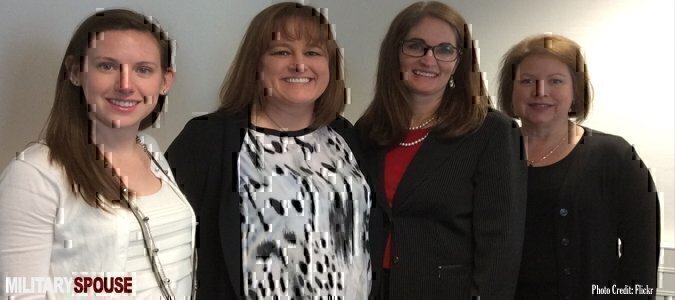From left to right Amanda Elliot (Storknest Sponsor), Sandy Cox (Storknest Sponsor Liaison), Kelly Rodriguez (Storknest Sponsor), Marissa Mordente (Storknest Sponsor and a huge support)
Picture this:
You’re a military spouse or a female active duty service member and you’re pregnant with your first child. It’s the most exciting time of your life. You and your husband have been planning, preparing and anxiously awaiting the birth of your child. You’ve eaten healthily, followed the plan, the room is furnished, and you’ve read the books and attended every doctor’s appointment. You’re ready.
Now, change the scenery:
What if you’re NOT in the United States or even a first world country? You’ve been sent on an accompanied or dual spouse assignment to Turkey, Bulgaria, Italy, Hungary or places in Africa that may not have the same standard of medical care or practices that, as an American, you’ve taken for granted.
What if you’re in a place where access to medical care is not up to American standards – not even close? And you are forced to sign pages of liability waivers in order to deliver your baby in a foreign hospital with non-English speaking doctors and nurses, with completely different standards of medical protocol and practices?
You’re panicked; overwhelming fear consumes you as a soon-to-be new mother. What do you do? Hope for the best and sign away?
No. The United States military and Tricare Overseas has a plan for you and the baby to ensure a safe delivery and wonderful after care. It’s called the Storknester Program. They will fly you to Landstuhl Army Medical Center (LRMC) in Germany to deliver your baby. You’re going to get the best medical care United States military has to offer by amazing doctors, nurses and staff.
But there’s a catch – you have to go alone.
Policy states that you’ll board an international flight or rotator when you reach the 34-36 week mark in your pregnancy – by yourself. Your husband isn’t authorized to join you until five days prior to your due date. You have to go it alone, separated from your spouse and possibly other children if you have them.
The medical staff at LMRC will provide you with the best medical care, try to calm your fears, and listen to your worries. But at the end of the day, you’ll walk or waddle back to the TLF, swollen feet, alone, and wait for another week or four weeks to pass until your husband can join you.
The scary part is you don’t know anyone. You’re in another foreign country without family, friends, or neighbors to support you. You hope the baby stays on schedule and you don’t have to deliver your child alone.
Storknesting: You don’t have to go it alone thanks to military spouses.
Meet Sandy Cox, a military spouse and former nurse. Her title is Storknester Sponsor Liaison. She’s not a paid member of the hospital or the Army– she’s a volunteer, a mom, a wife, and a friend to anyone who meets her.
She coordinates support for these new mothers who arrive without their spouses. Her goal is to ease the burden of expectant mothers and provide a more positive experience during a very stressful time.
Before January 2015, the scenario above was the life experience of any pregnant spouse or active duty member having a baby in a foreign country deemed not suitable for American standard of medical care. But that has changed since Sandy Cox and her team of military spouses began to run the all-volunteer Storknester Sponsorship Program.
Sandy leads the team of mostly military spouses. Their main objective is to act as a sponsor to these moms-to-be. Not unlike how the military would sponsor a service member moving to their new assignment.
A Storknester Sponsor is critical to the quality of life for an expectant mother. These sponsors will pick up the expectant mom from the airport and help them settle in. They will also drive them to the commissary once a week for groceries since most won’t have a vehicle. The hospital is located miles from commissary or BX.
Sponsors invite the expectant mothers to their house for a meal or welcome them during the holidays. These sponsors become part of their support network, a friend or family. There are times where sponsors will even be in the delivery room when the baby decides to follow their own schedule.
Sandy Cox says sponsors provide the emotional needs to these expectant moms, “We have nothing to do with the medical side. We are only focused on the quality of life while the ladies are here. We set up some boundaries. We are not a taxi service or a childcare service. They must figure those details out with the pre-arrival material that is provided by the Storknester Coordinator at LRMC. However, we provide them with the missing piece of having a baby – the community support and a friend.”
The Storknester Sponsor Program began in January 2015. The program serves all branches of the military and State Department from various embassies across Europe and Africa. However, the program mostly sees Air Force women who are stationed in Turkey and Navy spouses/active duty women stationed in Italy.
The sponsor program averages four to five Storknesters every month, which is on a constant rotation. The sponsors are trained and professional. They are military spouses and mothers who understand how scary it would be to go through this process alone. Lacy, an active duty service member stationed in Turkey, has firsthand experience:


With the help of military spouses, you don’t have to go it alone if you become a Storknester. You’ll have a friend on the ground to help bring your baby into the world. Military families supporting military families – that’s what military spouses do.
To learn more about the Storknesting and the Storknesting Sponsorship program, visit the LRMC website.
Read More: 4 Reasons Military Spouses Get a Bad Rap








